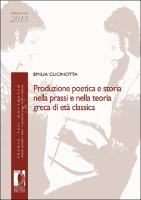Produzione poetica e storia nella prassi e nella teoria greca di età classica
| dc.contributor.author | Cucinotta, Emilia | |
| dc.date.accessioned | 2022-05-31T10:22:25Z | |
| dc.date.available | 2022-05-31T10:22:25Z | |
| dc.date.issued | 2014 | |
| dc.identifier | ONIX_20220531_9788866557005_436 | |
| dc.identifier | OCN: 971074737 | |
| dc.identifier.issn | 2612-8020 | |
| dc.identifier.uri | https://library.oapen.org/handle/20.500.12657/55152 | |
| dc.language | Italian | |
| dc.relation.ispartofseries | Premio Tesi di Dottorato | |
| dc.title | Produzione poetica e storia nella prassi e nella teoria greca di età classica | |
| dc.type | book | |
| oapen.abstract.otherlanguage | In “Poetics”, Aristotle accepts history among the possible themes for poetry, on the condition that the poet reaches the universal plane by narrating events which comply with the rules of eikos and of anankaion. With the alteration of Athens’s history in the dialogue “Menexenus” and Solon’s poem on Atlantis in the dialogue “Critias”, Plato precedes Aristotle’s reflection and gives historical narration a central role in the citizens' paideia. In the 5th century, Greek poetry on historical subjects, from Aeschylus’s piece “The Persians” to the poem “The Persians” by Timotheus of Miletus, anticipated and put into practice the themes which Plato and Aristotle would later argument on s theorethical level, namely: the intertwining between the particular of history and the universal of poetry, the models for the mimesis, the audience’s reaction spacing between eleos, phobos and geloion. | |
| oapen.identifier.doi | 10.36253/978-88-6655-700-5 | |
| oapen.relation.isPublishedBy | bf65d21a-78e5-4ba2-983a-dbfa90962870 | |
| oapen.relation.isbn | 9788866557005 | |
| oapen.relation.isbn | 9788866556992 | |
| oapen.relation.isbn | 9788892734142 | |
| oapen.series.number | 40 | |
| oapen.pages | 264 | |
| oapen.place.publication | Florence |

